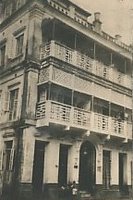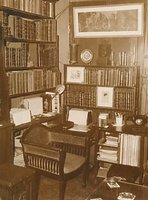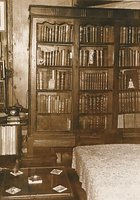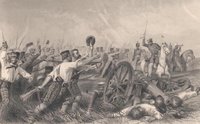
‘Many visitors to the city who had more than a passing interest in the history and society of that great city would, if they were lucky enough , eventually land on the doorsteps of
R.P.Gupta’s flat in the southern suburb of Ballygunge’ wrote Ian Jack in the obituary of Gupta in
The Independent , London. And if any of them had an interest in rare books and prints, would be taken over or referred to Kumar by Gupta. Not only that
R.P or Shatul as he was popularly known, made it a point to introduce all men of letters in India, particularly in Calcutta to Kumar.

Thus over years, Kumar was introduced to Jean and Krishna Riboud,
Satyajit Ray, Kamal Kumar Majumder, Shanti Chowdhury, Nikhil Sarkar, Raghubir Singh, Jean Racine, Marie Seaton, N.J.Nanpooria and a host of others.
Every other day , RP would visit Kumar on his way back from Tata Steel in Chowringhee , where he worked as the PR Manager and most of the days he was accompanied by an avid lover of books.He would enjoy introducing them to a world of books and looked at their awe that such a place existed in Calcutta. Since the library had rare books on all subjects-arts, history, music, botany, paintings, ornithology, you name it , there was nobody who returned without a treat .
Books were a passion for Radha Prasad Gupta.

He talked endlessly over phone with Kumar on books. Books that have just arrived from London, books, which are being, bided in auctions, books that have appeared in catalogues, books that have surfaced after many years of hibernation. It was books , books and books. But that was not the end R.P himself was a prolific writer, he as Ian Jack writes ‘was many things: a bibliophile, a writer in both English and Bengali, a gastronome, a cineaste, a collector of painting. Supremely, and in the traditions of his city, he was also a talker, with an exquisite, magpie gift for anecdotes and recherche facts and, eagle-like, for triumphant assertion’.

R.P. loved books . It did not matter to him that he might not be able to buy it. For that was not the point. He would like to go over the books. Read the books. Recommend the books. And even helped Kumar find the right home for the book. Sometime when Kumar mentioned the name of a buyer whom RP did not approve , he would say ‘But Oh. He does not read books’. He loved to interact with other book lovers whom he met at Kumars and most often than not, he would recount some tales on a subject on which the person is researching , for him to be floored. I remember of an Englishman who was working on the place Somerset. RP narated facts on Somerset to set the man thinking hard. Here was a man sitting in Calcutta , talking about Somerset , as if he has lived there all his life.To be told in the next minute that he has never set his foot on the place and all he said was from his knowledge from books.He knew many cities by heart. His knowledge was wide , even to imbibe information on wines. He could give details of the wine countries and seeing the label to locate the exact region from where the grapes came and their uniqueness.
Radha Prasad Gupta was born

in 1921 in Cuttack, Orissa, where his grandfather B.D. Gupta had become the first Indian principal of the town’s most important educational institution, Ravenshaw College, after a distinguished career as the professor of mathematics at Presidency College, Calcutta. Gupta and his five siblings grew up in some style in a large bungalow but his father died young and he reached Calcutta around the outbreak of the Second World War, to study economics .He settled inCalcutta and became a part of the Calcutta intelligentsia. For several years after university, Gupta did nothing very much by way of a living. He was, in the words of a friend, a Bohemian, in the true intellectual sense He spend his days endless coffee, late-night disputation, some private tutoring. The balance of his time was spent among the second-hand bookstores in the narrow lanes of old Calcutta, searching for 18th and 19th century books, prints and ephemera. It is in one of such sojourns that he met Kumar in one of the College Street book shop and Kumar took him to his residence which housed his library. Thus began a life long relation with Nirmal Kumar.
Kumar

encouraged him to build his own collection and he began modestly with Bengali books, which were not that expensive. Gupta lamented latter that Kumar persuaded him to add to his collection the famous Elephantine Folio of Thomas & William Daniell , which he declined in spite of Kumar being agreeable to take only the cost price and that too in instalments.In latter years his flat became a treasure house of such things. He built up a prized collection of Kalighat pats, the pictures painted as souvenirs for pilgrims to Calcutta’s Kali temple, often comic, of which RP became a world authority.
The obituary that appeared on the death of Kumar in 1978, in the leading Bengali daily Anandabazar Patrika, was written by R.P. Gupta. It is unfortunate to note that when R.P. Gupta, died in Calcutta on March 9, 2000, the leading Calcutta dailies did not carry his obituary. It was left to Ian Jack to publish his obituary in The Independent , London.
Images : Radha Prasad Gupta . Satyajit Ray . A rare book such as in the collection of R.P.Gupta. Grindlays Scenary . Kalighat Pat. Calcutta by Daniell


 own collection of
own collection of














